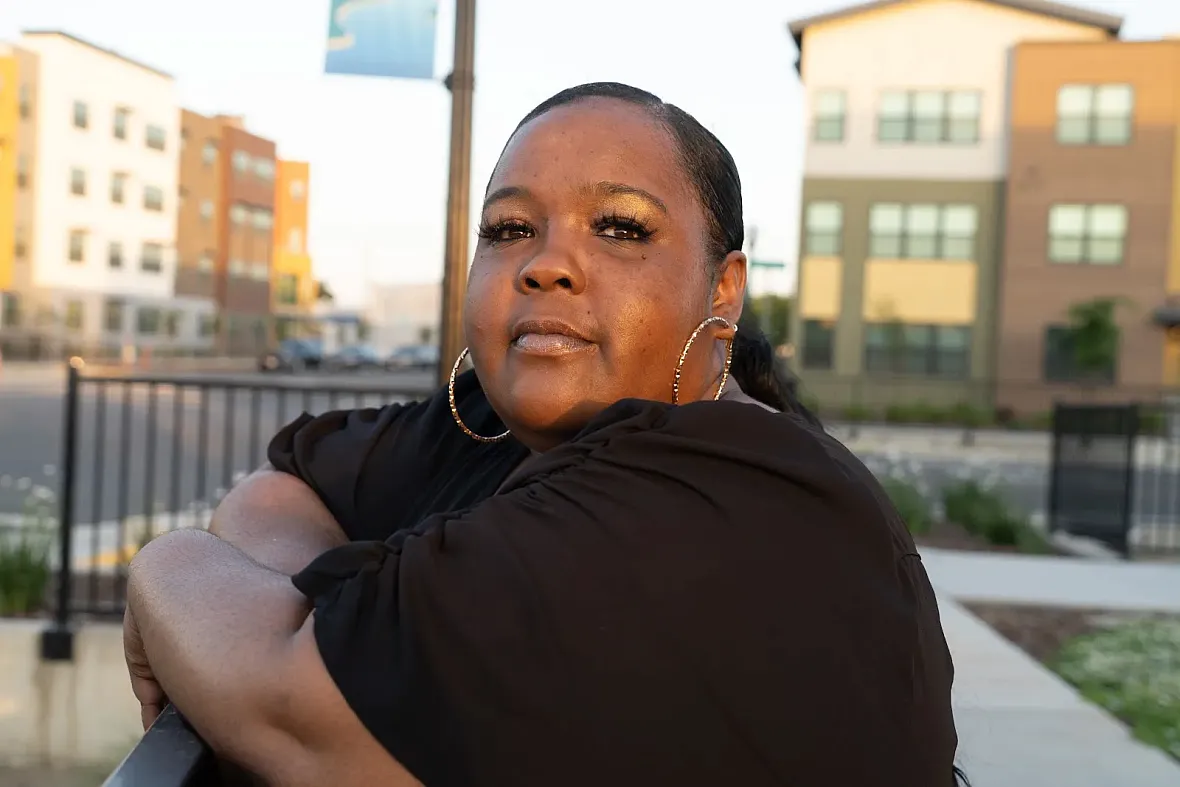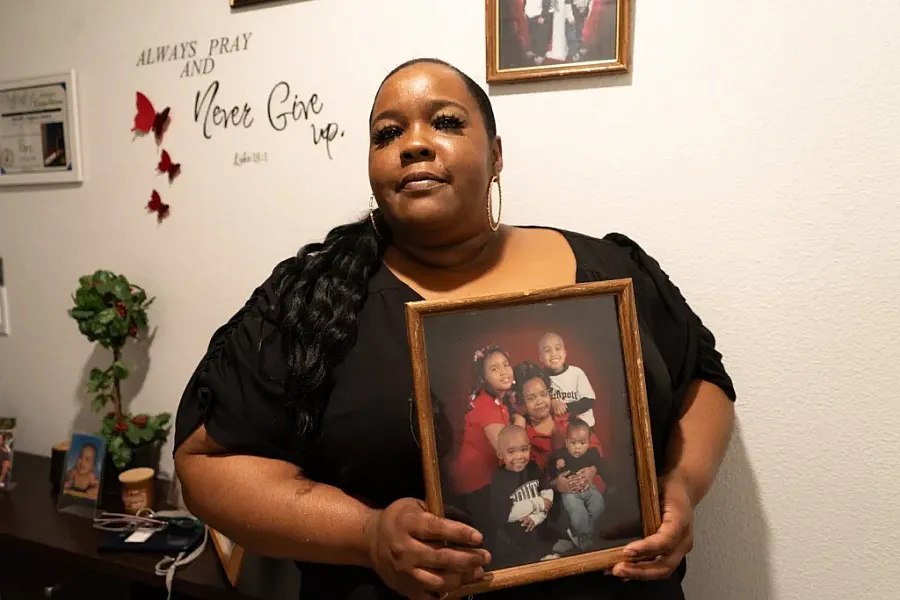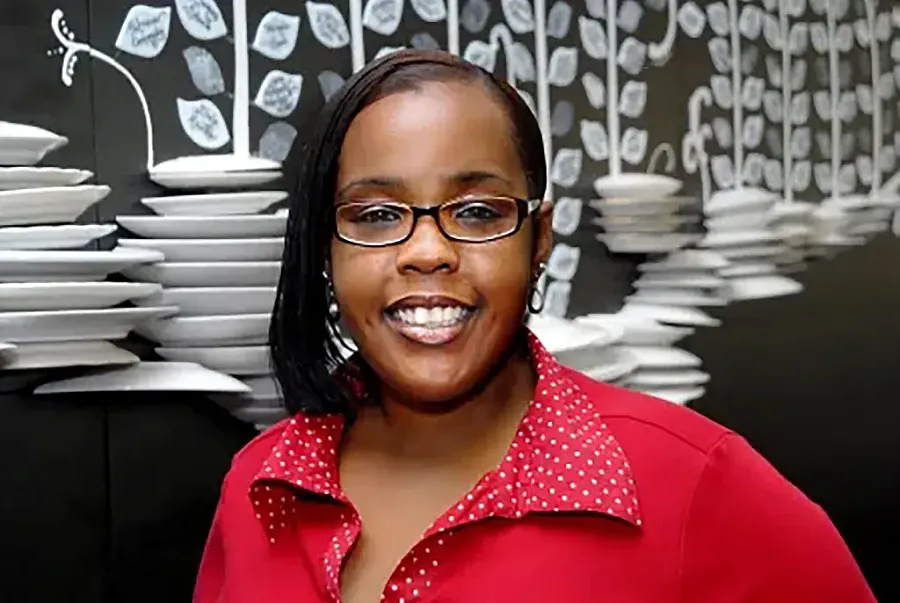Sacramento Mother Overcomes Addiction, Rebuilds Family
The story was originally published by The Observer with support from our 2025 Child Welfare Impact Reporting Fund.

After years of ups and downs, Ebony Price looks forward to continued sobriety and upward mobility. After bouts of homelessness she moved into a new apartment in October.
Roberta Alvarado, OBSERVER
Generationally impacted by the child welfare system, Ebony Price is working on keeping her life on the right track and being present for her family.
Price is a recent graduate of the local Women’s Empowerment program that helps participants prepare for employment and life after homelessness. Price completed the program in January and still finds comfort and connections there.
On a recent visit, a woman ran up to the 42-year-old, hugging her tightly. The two embraced, visibly happy to see each other.
“We used to prostitute on the streets together,” Price says.
She admits to avoiding her old friend when she first saw her at Women’s Empowerment.
“I knew she had changed her life and I wasn’t ready to face her,” Price says.
Learning to face herself has been an even bigger challenge.
Price first appeared in The OBSERVER in April 2013 as an employee of Plates to Go, a restaurant staffed through a training program run by the St. John’s Shelter Program for Women and Children. She learned of it in 2010 after getting out of jail and losing her children again due to her drug addiction.
“I know how to program,” says Price about opportunities she has been afforded over the years.
Typically the programs and her stints at local rehab facilities were stipulations of her parole or probation. The most successful, however, have been ones she found on her own such as Plates and Women’s Empowerment.
“Mostly all of them offer you aftercare, but once aftercare is gone, guess what? You’re totally on your own and if you don’t have those tools, or you aren’t tuning into tools that you need, you’re gonna fall back into the same old ways.”
The momentum she has gained from the programs has often been interrupted.
Survivor Mode

Ebony Price has a long family history with CPS, including losing custody of her four children at different times. She recalls getting them back for good: “It was the best feeling. I walked in there and I was able to hold my head up. I knew that I had done nothing wrong, but I just needed a little help, but no one was willing to hear me.”
Roberta Alvarado, OBSERVER
Seeking safety from domestic violence resulted in her losing her children for five years. Price escaped, bringing her children to her grandmother’s house. She hoped for solace and security, but instead encountered further hardship and instability. Her grandmother accused her of sticking a pencil in the butt of one of her sons. Price denies that claim, but her children were taken.
She later regained custody, but Price says her children still have scars from their time at the Sacramento Children’s Receiving Home and from being in their great-grandmother’s care. One of her sons has ADHD and PTSD, she says, and her oldest daughter is now having her own battles with CPS.
Price also has lived with the residual effects of being system-involved.
“I just kind of checked out,” she says of that time. “I tried my best to do what I could, but I had no support. My mom was in jail. My dad was in jail. My other grandmother was sick. It was just me. I called my aunt to come to court and she was like, ‘Call me later. I got a warrant. I can’t come up there.’ So I had no support.”
Price was spiraling. She had her first child at 14. The young mother dropped out of school in the 10th grade to also help her mother with her siblings who had mental and physical challenges. She had two more children by age 21. She feels the courts made judgements about her, and her ability to parent, based on the clothes she wore and the way she talked.
“If they’d have helped me, I probably wouldn’t have used drugs for as long as I used drugs just to stay afloat,” she says.
‘A Different Future’
Adverse childhood experiences (ACEs) and trauma harm youth development and increase system involvement. In California, 72% of adults report at least one ACE (20% report four or more) and 34% of children report at least one ACE (4% four or more). These include abuse, neglect, and household dysfunction.
When her parents were incarcerated in her younger years, Price was sent to live with her grandparents and her brothers were placed into foster care by CPS.
“They fail people. Taking kids from their parents, that’s the worst they can do,” Price says. “Not everyone deserves to have a chance with their kids, but a lot of people do, so give them that chance, at least, because it’s not easy.”
While at Women’s Empowerment, Price worked closely with social worker Sierra Wilson, who witnessed her “honesty, heart and grit.”
“Even through deep loss and constant pressure, she showed up day after day,” Wilson says. “She stayed connected and kept doing the hard work of healing, even when it would have been easier to shut down.
“Losing a child to CPS isn’t just a legal process, it cuts deep. For women like Ebony, it can feel like the world is saying they’re not worthy of love or motherhood. But she refused to accept that. She chose to fight for herself and for a different future.”
Price wishes she’d found Women’s Empowerment sooner.
“I’ve been in many programs, but there was something about this one,” she says. “I think I made up my mind that I was just ready. I was just over all that other stuff. They said, ‘We’re here with you. We’re not going to leave you.’ It was them showing up every single morning, just trying to help us help ourselves. I really admired that.”
Family Matters

Ebony Price first appeared in The OBSERVER in April 2013.
Larry Dalton, OBSERVER File Photo
Price says she’s equally committed to helping her own children succeed, even as adults.
“I’ve never been able to be a support to my kids because I’ve always been in a program on probation, or rehab, or involved with CPS. I’ve never really been able to be a solid support for them, so I made it a point to stay out of trouble.”
Price credits her youngest child with her current path.
“My 14-year-old, she said, ‘You just focus on getting you together.’ That’s probably the best gift that she’s ever given me. She said, ‘Focus on yourself’ and that’s what I’ve been doing.”
She has been clean for three years and backsliding isn’t on her agenda, she says. One tenet of sobriety is taking things one step at a time, but Price has high hopes for her future.
“I can see that far now because I know what I want now. I want to have a nice career that I enjoy doing. I want to be able to own my own home,” she says.
Her well-being is a work in progress.
“I’m constantly on the computer, trying to figure out more training, more classes, until I get to where I need to be completely,” she says.
Price uses her experiences to help others as a peer support specialist and wants to start her own trauma-informed support program. Recent research highlights the urgent need for service systems to address health care needs of people with trauma history in a therapeutic way to prevent retraumatization.
Many existing efforts, Price says, fail to reach those who have been “in the streets” for extended periods.
“If you don’t talk about trauma and take that part out first, people are going to keep going back and forth because they’re not equipped with the right tools,” Price says.
She has added a valuable tool to her personal arsenal: loving herself.
“I didn’t. I was worthy, I knew that, but I just had to figure out some things,” she says. “I had to figure out my place and who I was because I didn’t know. I had a baby at 14 and I just lived life. I never gave myself a chance to be the woman I knew how to be.”

